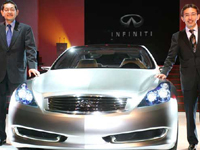China car market has great expectations for near future
Hyundai Motors opened a $1 billion plant in China on Tuesday with partner Beijing Automotive, part of an aggressive expansion that could turn the continent into its largest overseas market by 2010. The companies are equal partners in a venture that now operates two plants and aims to double capacity in China to 600,000 units by 2010.

"China could become larger than the United States in three years," said Jake Jang, a Hyundai spokesman.
The company expects to sell 100,000 remodeled Elantras built at the new plant this year, pushing total China sales to 380,000 units this year, a 65 percent jump from about 230,000 last year.
The new Elantras, the first new models introduced by Hyundai into China in 18 months, will sell for 99,800 yuan to 129,800 yuan ($14,250-18,540), the company said.
However, analysts worry that Hyundai's projections are too optimistic and the new plant could lead to overcapacity.
Hyundai's sales in China fell to 230,000 units last year from 290,000 in 2006 as the company failed to introduce any new models in one of the world's fastest growing markets.
Analysts said the company needed to cut costs and offer new models to fight global rivals, some of which have prospered in China's soaring car market, offsetting slow sales at home.
Hyundai is also planning to bring its high-end Genesis to China in June, with a sales target of 1,500 units in 2008 for the luxury sedan which should sell for just over $50,000, executives said.
The company is also looking to introduce a $5,000 to $6,000 economy sedan, codenamed "RB", into China perhaps as early as 2010.
But the ultra-low-cost car would compete against even cheaper Chinese models, as well as planned sub-entry-level cars from Toyota Motor, General Motors, Volkswagen, Nissan Motor and Honda Motor.
Nevertheless, Hyundai hopes to capture 10 percent of the China market along with its affiliate Kia Motors Corp by 2010, selling 1 million units in the mainland.
The new Elantras will reach 87 percent local content, which would exceed Chinese regulations and help to lower costs, said Edward Yoon, the chief financial officer of Hyundai Motor Group ( China ).
Executives also said they hoped prices in China would stabilize this year after predatory price cuts last year eroded profits, while fast growing steel prices and rising labor costs would make further cuts difficult.
The Hyundai Motor Company, a division of the Hyundai Kia Automotive Group, is South Korea's largest and the world’s fifth largest Automaker in terms of units sold per year. Its headquarters are in Seoul, South Korea. In Ulsan, South Korea, Hyundai operates the world’s largest integrated automobile manufacturing facility, which is capable of producing 1.6 million units annually. The Hyundai logo, a slanted, stylized 'H,' is said to be symbolic of two people (the company and customer) shaking hands. Hyundai means "modernity" in Korean.
Subscribe to Pravda.Ru Telegram channel, Facebook, RSS!





